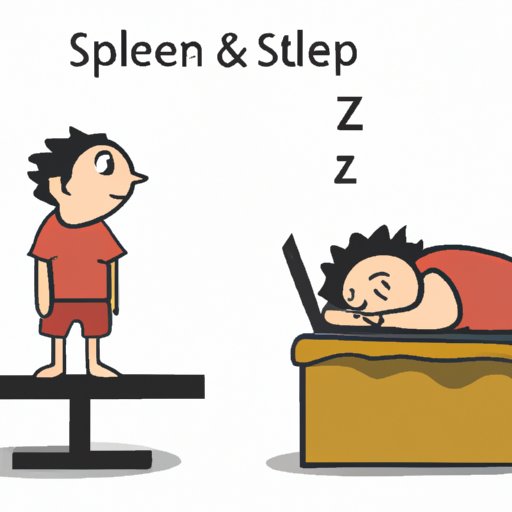
Introduction
Sleep deprivation is a condition that occurs when an individual receives inadequate or poor-quality sleep. Both the quantity and quality of sleep are crucial to living a healthy life. The recommended amount of sleep for adults is between 7-9 hours a night, but many people fail to achieve this. Lack of sleep can have adverse effects on a person’s physical health and mental wellbeing, including weight gain or loss.
The Correlation Between Sleep Deprivation and Weight Gain: Myth or Fact?
Some studies suggest that sleep deprivation can cause weight gain, while other studies claim that there is no definitive connection between the two. However, many experts believe that sleep deprivation can have a direct impact on body weight. Research shows that sleep-deprived adults are more likely to gain weight than those who get enough sleep.
Several studies have found a link between sleep deprivation and increased levels of the hunger hormone ghrelin. At the same time, levels of the satiety hormone leptin decreased, leading to overeating and weight gain. Sleep deprivation also affects the brain’s reward system, increasing cravings for high-calorie foods.
Despite these findings, other studies suggest that there are other variables at play, such as lifestyle factors and dietary habits. Regardless, it’s clear that adequate sleep plays a vital role in weight management.
The Science Behind Sleep and Metabolism: Understanding the Link to Weight Loss
Hormones such as growth hormone, cortisol, insulin, and leptin play a significant role in regulating metabolism and weight loss. These hormones are released during different stages of sleep and can be disrupted by sleep deprivation. For example, lack of sleep can lead to an increase in cortisol, which is associated with fat storage. Cortisol also promotes insulin resistance, leading to weight gain and other health problems.
Studies have shown that sleep-deprived individuals have lower levels of leptin, which signals the brain when the body has had enough food to eat. This reduction in leptin levels causes the brain to misinterpret signals and signals hunger, making it more difficult to stick to a healthy diet. Research has also shown that inadequate sleep can impair glucose tolerance and affect the body’s ability to burn calories efficiently.
The Best and Worst Foods to Eat for a Good Night’s Sleep
The foods and drinks you consume can profoundly impact the quality and quantity of sleep you get. Caffeine, alcohol, and nicotine can disrupt sleep patterns and should be avoided or limited before bedtime. Similarly, spicy, heavy, and high-fat foods can cause heartburn and other digestive issues that may interrupt sleep.
On the flip side, eating a balanced diet rich in complex carbohydrates, protein, and healthy fats can promote better sleep. Foods such as nuts, fruits, vegetables, lean meats, and low-fat dairy products can help regulate the sleep-wake cycle and promote optimal sleep. Avoid consuming large meals or snacks near bedtime, as doing so can cause digestive issues and make it harder to fall asleep.
How to Build a Sleep-Friendly Environment for Optimal Weight Management
The environment in which you sleep plays an essential role in how well you sleep. It’s essential to create a sleep-friendly environment that promotes restful sleep. Some factors that negatively impact sleep include temperature, noise, and lighting. A cool, dark, and quiet room is ideal for sleeping, and investing in a comfortable mattress, pillows, and bedding can also improve sleep quality.
Other factors that can impact sleep quality include electronic devices such as phones, tablets, and computers. The blue light emitted by these devices can interfere with sleep patterns, leading to sleep deprivation. To promote optimal sleep, avoid using electronic devices before bedtime and turn off any electronics inside the bedroom.
The Connection Between Stress, Sleep, and Weight: How to Manage the Three for a Healthier You
Stress often goes hand in hand with sleep deprivation and weight gain. Chronic stress can lead to the release of cortisol, leading to a decrease in leptin levels and an increase in ghrelin levels, leading to overeating and obesity.
To manage stress, try relaxation techniques such as deep breathing, meditation, and yoga. Regular exercise can also help regulate cortisol levels and reduce stress. Prioritizing sleep and adopting healthy sleep habits can also have a significant impact on stress levels, promoting relaxation and better mental health.
Conclusion
In conclusion, the relationship between sleep and weight is complex and multifaceted. While there is no definitive answer, studies suggest that sleep deprivation can have a direct impact on weight, leading to weight gain and other health problems. Poor sleep can negatively impact hormones responsible for metabolism, making it harder to lose weight.
To promote optimal sleep and weight management, it’s essential to prioritize sleep hygiene, diet, exercise, and stress management. Creating a sleep-friendly environment, avoiding foods and drinks that can disrupt sleep, and adopting relaxation techniques can all significantly impact sleep quality and promote a healthier weight.
It’s clear that sleep is an essential aspect of overall health and wellbeing, and its importance should not be overlooked in the pursuit of a healthy lifestyle.





